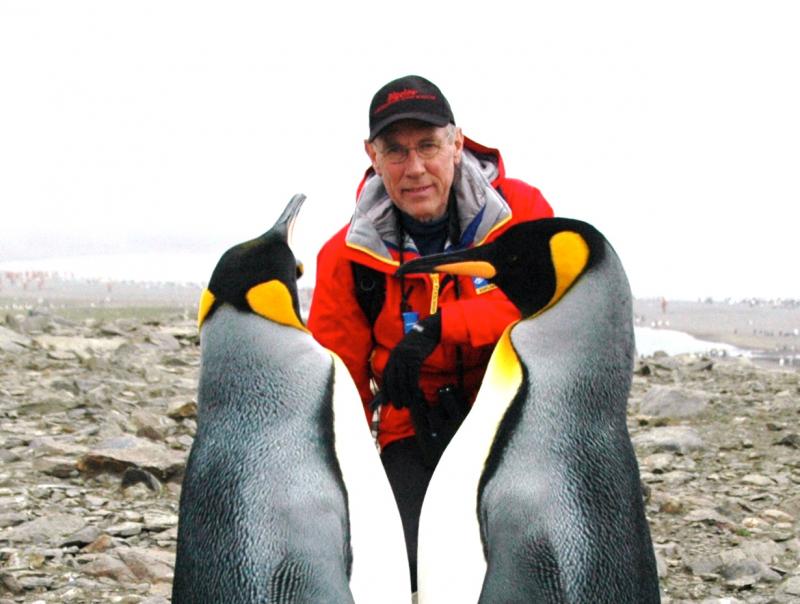Learn how Boothbay’s Bigelow researchers are rewriting the book on climate change
 Bob Healing with King Penguins in the south Atlantic. Healing, a member of the Bigelow Laboratory for Ocean Sciences Board of Trustees, will discuss the groundbreaking research the lab is doing on climate change and ocean acidification at St. Andrews Village on May 15. Courtesy of Bigelow Laboratory
Bob Healing with King Penguins in the south Atlantic. Healing, a member of the Bigelow Laboratory for Ocean Sciences Board of Trustees, will discuss the groundbreaking research the lab is doing on climate change and ocean acidification at St. Andrews Village on May 15. Courtesy of Bigelow Laboratory
 Bob Healing with King Penguins in the south Atlantic. Healing, a member of the Bigelow Laboratory for Ocean Sciences Board of Trustees, will discuss the groundbreaking research the lab is doing on climate change and ocean acidification at St. Andrews Village on May 15. Courtesy of Bigelow Laboratory
Bob Healing with King Penguins in the south Atlantic. Healing, a member of the Bigelow Laboratory for Ocean Sciences Board of Trustees, will discuss the groundbreaking research the lab is doing on climate change and ocean acidification at St. Andrews Village on May 15. Courtesy of Bigelow Laboratory
Learn how Bigelow Laboratory for Ocean Sciences researchers are helping to rewrite the textbook on global climate change and the changing chemistry of the world’s oceans at St. Andrews Village on May 15.
Bob Healing, a member of the Bigelow Laboratory’s Board of Trustees, will offer an overview of the world-class research being done by scientists headquartered at the East Boothbay facility. The talk will begin at 1 p.m.
Founded in 1974 as a private nonprofit research institution, Bigelow employs more than 80 people, including 16 senior research scientists, and is focused on the microbial life and biogeochemical dynamics of the world’s oceans.
Healing’s talk, titled “The Microbial Ocean ... Epicenter of Life on Earth,” will center on the role the world’s oceans play in moderating climate change and how the increasing amount of carbon dioxide in the atmosphere is changing the chemistry of the world’s oceans.
Ocean acidification has been called the “evil twin” of global warming because of the effect it has on plants and animals that live in the ocean and on the ability of the world’s oceans to continue to absorb carbon dioxide emitted by man-made activities.
Since the industrial revolution, the amount of carbon dioxide in the atmosphere has risen by roughly forty percent according to the National Oceanic and Atmospheric Administration, but the world’s oceans have buffered the impact of that trend by absorbing huge amounts of carbon.
As the oceans have absorbed more carbon dioxide, however, they have become more acidic and scientists are concerned that the change in ocean chemistry could have a severe impact on the plants and animals that make up the oceans’ food web.
Bigelow is a leader in research to develop a better understanding of the potential impacts to both marine plants and animals as the world’s oceans become more acidic. The change could have profound consequences on all life on earth with many Maine species likely to be among the first affected.
Oceans produce half of the oxygen we breathe and food for about 1 billion people. Mollusks, like clams and oysters, and crustaceans like lobsters, are among the organisms that would be impacted.
This presentation is free and open to the public, but space is limited, so please call 207-633-0920 to reserve a space.
Event Date
Address
United States






















